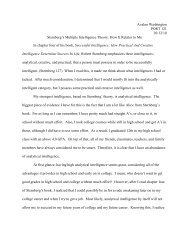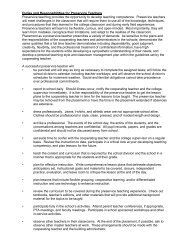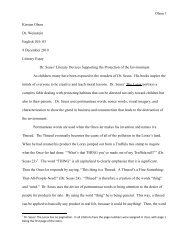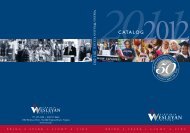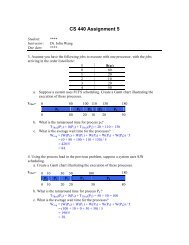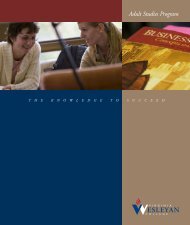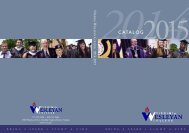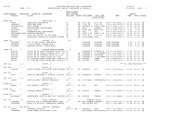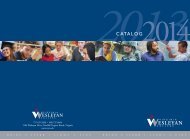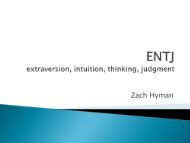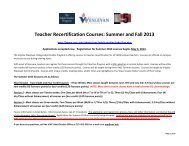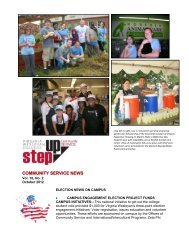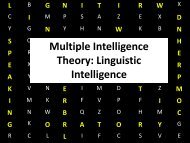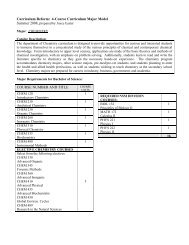2008-2009 Catalog - Virginia Wesleyan College
2008-2009 Catalog - Virginia Wesleyan College
2008-2009 Catalog - Virginia Wesleyan College
- No tags were found...
You also want an ePaper? Increase the reach of your titles
YUMPU automatically turns print PDFs into web optimized ePapers that Google loves.
PLAN OF STUDY 35discovered that too many students view their collegeexperience as bifurcated into “sets of classes”—courses intheir major, courses in general studies, and electivecourses—and “everything else”—learning outside theclassroom through co-curricular activities, careerdevelopment fieldwork, or volunteer experiences. ThePORTfolio Program is a unique four-year experience thatseeks to fully integrate liberal and experiential learning byconsciously relating the two.The PORTfolio Program brings the liberal arts to lifefor selected students by allowing them to pursue theircollege education while using the Chesapeake Bay, the citiesof Hampton Roads and the world as their classroom.Complementing a student’s major, the PORTfolio Programoffers an integrated set of specially designed team-taughtliberal arts seminars, co-curricular activities, andexperiential learning opportunities that connect the best ofa liberal arts education with real-world experiences. Inaddition, students in the program develop an electronicportfolio that helps them connect the lessons of theclassroom to the world beyond the campus and link fieldexperiences to their formal education. Freshmen areadmitted to the program based on their academic, serviceand leadership experience, and potential. Applications forthe PORTfolio Program are made at the same time studentsapply to the college.Inquiries about the PORTfolio Program may beaddressed to the Office of Admissions.Experiential Learning<strong>Virginia</strong> <strong>Wesleyan</strong> <strong>College</strong> provides students withlearning experiences which allow them to obtain practicalknowledge in the world beyond the campus. Theseexperiences may help the student to translate classroomtheory into practice, refine knowledge and skills, contributeto organizations on a professional level, test careerpossibilities, as well as enhance marketability for futureemployment and/or graduate studies.EXTERNSHIPS are structured work experiences whichallow students to observe and to gain exposure to a workarea of interest. Designed primarily for freshmen andsophomores, these experiences may confirm an academicmajor, allow self-assessment of skills and suitability for aprofession, and provide training that leads to internships orjob opportunities. Externships may have prerequisites set bythe sponsoring organization and, although they arerecorded on the student’s transcript, they do not providesemester hours towards meeting graduation requirements.To have the externship recorded on the transcript, a studentmust complete at least 30 hours of approved work at aparticipating institution and arrange the externshipthrough the Career Services Center before beginning it.INTERNSHIPS are learning experiences that integrateacademic preparation and skills gained in a liberal artseducation with professional work experience. There are twotypes of internships.Non-academic internships allow qualified students toundertake meaningful responsibilities with sponsoringorganizations. They are not recorded on the transcript anddo not provide credit-hours towards meeting graduationrequirements, but they may provide invaluable experiencefor later life. The Career Services Center maintainsinformation on both academic and non-academicinternships.Academic internships are designed for students toundertake significant responsibilities, to reflect on themission and daily activities through completion ofapproved assignments such as papers or projects which aresubmitted to a faculty member, and often are accompaniedby a seminar or other academic component. These aredesigned primarily for juniors and seniors within theirmajor field of study, and students must meet theprerequisites specified by the academic department whichoffers such internships. To be admitted to the internshipprogram, a student must meet the appropriate criteria,register for an approved internship class listed in thecatalog, and fulfill the academic and work requirementsspecified by the course. The minimum standard foracademic internships established at <strong>Virginia</strong> <strong>Wesleyan</strong><strong>College</strong> is 100 hours of work experience for 3 semesterhours. These academic internships help meet graduationrequirements, and they provide the student with theknowledge and know-how to do well later in life.See descriptions of <strong>College</strong> Level Examination Programs(CLEP) and Military credit under “Adult Studies Program.”Academic ResourcesSupport Services: <strong>Virginia</strong> <strong>Wesleyan</strong> offers its studentsseveral sources of academic support which are available freeof charge. These support services include writing assistancethrough the Writing Center, and peer and professionaltutoring, study skills workshops and courses, and individualacademic counseling through the Learning Center. Contactpersons: Dr. Carol Johnson, director of the Writing Center;Ms. Althia Woodson-Robinson, director of the AcademicSkills Program; and Mrs. Fayne Pearson, assistant to thedean of the college, coordinator of services for special needsstudents, and coordinator of the Learning Center.Accommodations for Students With SpecialNeeds: <strong>Virginia</strong> <strong>Wesleyan</strong> recognizes, and is sensitive to,the needs of students with disabilities, as well as otherhandicapping conditions. In keeping with Title 5, Section504 of the Rehabilitation Act of 1973, the college willrespond to requests for accommodations when the requestsare based upon recent medical or other acceptableprofessional documentation of disabilities. A student’sdecision to use academic support services and to seekaccommodation is voluntary. The student has theresponsibility for contacting the appropriate person, theassistant to the dean of the college, in order to requestaccommodation for a handicapping condition or a learningdisability. In cases where there is strong evidence of alearning disability, the college will make arrangements fordiagnostic testing at the student’s expense. In cases where ahandicap has been documented, arrangements for theappropriate accommodations will be made to support thestudent in the academic program that will fit his/heraptitudes and skills and, at the same time, adhere to<strong>Virginia</strong> <strong>Wesleyan</strong>’s requirements.



